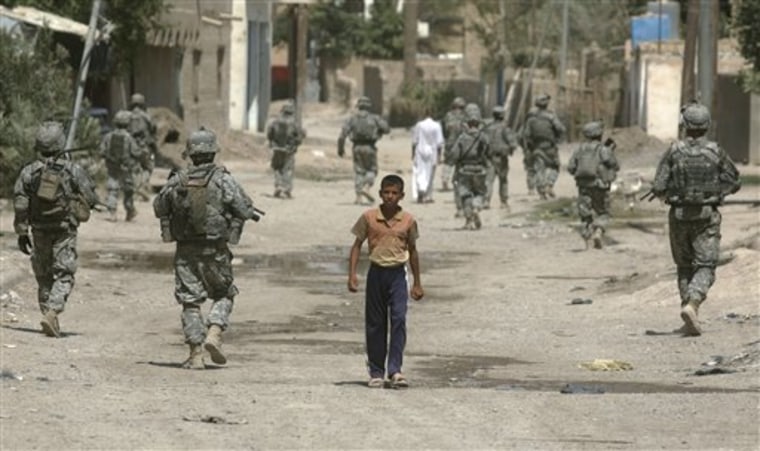The government offices in Iraq's Diyala province are encased in thick blast walls, a shield against suicide bombings. Nearby buildings are pockmarked from fighting between U.S. troops and Sunni insurgents.
Diyala has proven one of the toughest pieces of Iraqi real estate to control despite several major U.S. and Iraqi military operations.
The stakes are high. The corridor between the provincial capital of Baqouba and Baghdad, 35 miles to the southwest, has been a key conduit for the trafficking of weapons and foreign fighters into the Iraqi capital.
Diyala's proximity to Iran also makes it a strategically important to the United States, which accuses Tehran of supporting Shiite militias.
But signs of stability are emerging in Baqouba and surrounding areas as a new U.S.-backed Iraqi offensive enters its second month. The unanswered question is whether the latest attempt to pacify Diyala will succeed where others faltered.
Hopes pinned on Iraqi forces
The U.S. military has pinned its hopes on improved Iraqi security forces, with the government sending thousands of additional troops to the province for the new push.
"The Iraqi surge is the major differentiator with previous operations," Michael Knights, a military and security analyst with the Washington Institute for Near East Policy, said in a telephone interview.
Also in its favor is a U.S.-funded Sunni revolt against al-Qaida in Iraq and a Shiite militia cease-fire that have sharply diminished the ability of extremists from both sides of the sectarian divide to operate.
But while those factors have been key in tamping down violence nationwide, they have been slower to take hold in Diyala. The area has a volatile mix of Sunni and Shiite militants along with desert terrain and dense palm groves that provide refuge. A large Kurdish community in the north adds to the mix.
In Baqouba, which the al-Qaida-front Islamic State of Iraq once proclaimed as its capital, shot-up buildings and crumbled sidewalks are the legacy of the fierce fighting between U.S. forces and insurgents.
The provincial government offices are surrounded by concrete walls nearly 15 feet high that protect the officials from bombings that have struck the bustling street outside.
Blasts and gunfire occasionally rip through the night, but music from weddings and other celebrations also can be heard.
'We were suffering'
The main market is no longer the site of public execution-style killings that were once common among the Islamic fundamentalists. An Iraqi National Police brigade deployed to the area for the offensive has set up headquarters at the city's sports stadium.
"We were suffering," said Samira Hamid al-Halina, whose son was killed by al-Qaida in Iraq.
"We feel better, more secure and safe. We can go outside without being frightened," she added, standing under a bunch of dates ripening on a palm tree as Iraqi troops searched her compound in the Sunni enclave of Harbatiliyah, 15 miles northeast of Baqouba.
But green flags commonly associated with Shiite militias are still planted at intersections and even some local Iraqi police checkpoints, signaling underlying sectarian tensions.
That raises concern that the security gains could prove fragile without progress by the Iraqi government in promoting reconciliation between the fractured ethnic and sectarian groups.
Knights said upcoming provincial elections that can distribute power more equitably will be key. Sunnis boycotted the last popular vote in 2005, allowing Shiites to take a disproportionate share of the power in the province of 1.5 million people.
"Security can freeze Diyala so it doesn't get any worse, but politics is needed to solve it," he said. "The only way of really solving Diyala is through the political roots, such as provincial elections and a more balanced provincial council."
In a recent example of high-level distrust, the provincial council ousted the longtime Shiite police chief Maj. Gen. Ghanim al-Qureishi earlier this month amid allegations of abuse against Sunnis.
A dirt road leading through a cluster of palm trees near Baqouba shows another side of the story.
U.S. soldiers and Iraqi National Police forces were upset to find a blanket and utensils on the ground. The camp hadn't been there the day before when the troops cleared the area, meaning suspected insurgents had made their way back or were still hiding among the trees.
Bruce Hoffman, a terrorism and counterinsurgency expert at Georgetown University in Washington, D.C., says the militants are likely avoiding head-on confrontations with the strengthened security forces to give themselves a chance to regroup.
"Al-Qaida in Iraq is really hoping to survive and sustain its struggle over time and hoping that its forces will change in the future but not engaging any direct contact now," Hoffman said.
